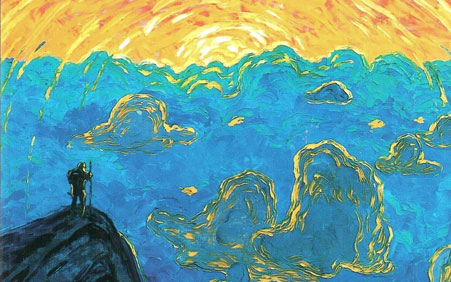
Look Into The Mirror
Why did I startle in my dream,
so that I awoke?
That is the question isn’t it? Dreams and night visions are the stuff of literature. The story of Macbeth comes to mind. No one knows for sure from whence comes a dream. I remember talking about dreams with a therapist. She recognized dreams to be important material worth probing. Does a dream come from a divine source, the voice of God? Or perhaps from the darkness of my inner core, of which I scarcely can bear to glimpse?
Is the Bible, the Christian and Jewish holy scripture a book of dreams? The story of Joseph is about a dream that forewarns of disaster, and of a method for survival. Mary in the Gospel of Luke has a dream.
Did not a child come to me, carrying a mirror?
“O Zarathustra” – said the child to me
— “look at yourself in the mirror!”
WTF! Who really, truly wants to see themselves in a mirror? We go to great lengths, and expense to characterize ourselves, to project upon the screen of another’s perception, the ego’s desire. The style of my clothing, the sneakers that I wear, the vehicle which I own – sends a message, my curated message.
But when I looked into the mirror,
I shrieked, and my heart throbbed:
for not myself did I see therein,
but a devil’s grimace and derision.
Truly, all too well do I understand the dream’s portent and monition:
my doctrine is in danger;
tares want to be called wheat!
My enemies have grown powerful
and have disfigured the likeness of my doctrine,
so that my dearest ones have to blush for the gifts
that I gave them.
A dream can be disturbing. Is it possible there’s one single, and final truth about myself? Some essence? Something which when grasped, nothing more remains to be said? Think! My gut instinct says there isn’t. Who am I? I think that depends very much upon stories of my life that I presently believe. And the stories which are believed by others. This dream carries a portent of a serious and hazardous misunderstanding. I suspect that it is easier to deceive ourselves, to believe my own fantastic tale, rather than accept my unique strength or to recognize the all too familiar demon that weakens me. Nietzsche/Zarathustra is apprised by a dream that the POV which he advocates is going to be massively misunderstood. Make no mistake to take a stand, means that one must contend with opposition. Opposition can be due to misunderstanding. And opposition can be malicious, a dark intention to disfigure, Do you see yourself as angel? Prepare yourself to be regarded as a demon by someone else.
Lost are my friends;
the hour has come for me to seek my lost ones!
–With these words Zarathustra started up,
not however like a person in anguish seeking relief,
but rather like a seer and a singer whom the spirit inspires.
With amazement did his eagle and serpent gaze upon him:
for a coming bliss overspread his countenance
like the rosy dawn.
Thus Spake Zarathustra by Friedrich Nietzsche, trans. by Thomas Common, The Child With The Mirror No. 1
I am entranced with the final paragraphs of the quoted passage. How does one respond to opposition? Respond if you can with the tough resilience of an inspired one. With vision of a potential good future, inspirited with a song! By leaning toward the sunrise, that’s how to respond to opposition…